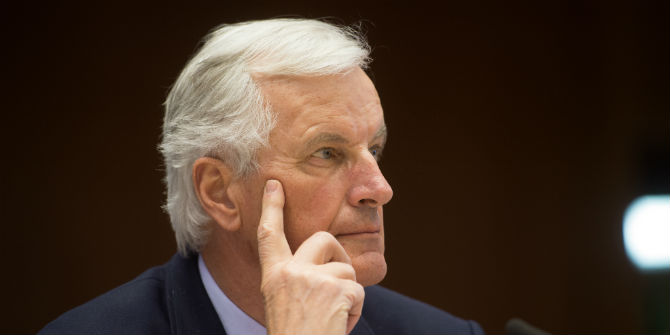
 The EU has been popularly derided as ineffectual, but it has shown remarkable co-ordination and unity in its Brexit negotiations with the UK. Dermot Hodson (Birkbeck College) and John Peterson (University of Edinburgh) explain how Michel Barnier has outflanked the UK, with both the Commission and the Council presenting a united front.
The EU has been popularly derided as ineffectual, but it has shown remarkable co-ordination and unity in its Brexit negotiations with the UK. Dermot Hodson (Birkbeck College) and John Peterson (University of Edinburgh) explain how Michel Barnier has outflanked the UK, with both the Commission and the Council presenting a united front.
Before British voters went to the polls in June 2016, the institutions of the European Union (EU) were dismissed as ‘sclerotic, over-centralised and undemocratic’. Those same EU institutions are now portrayed as running rings around British negotiators. Here we find another – amongst many – of Brexit’s ironies.

This state of affairs stems from popular misunderstanding in the UK, as well as elsewhere, of how EU institutions actually work. It also reflects the fact that Brexit is a challenge to which EU institutions are better suited than their British counterparts. The loss of two senior Cabinet members days after the Cabinet agreed on a new negotiating position makes British political institutions’ deficiencies all too clear.
Theresa May’s decision to put David Davis in charge of a new Department for Exiting the European Union (DExEU) in July 2016 helped to contain cabinet tensions in the immediate aftermath of the referendum. But it also weakened the UK’s negotiating position. Creating new government departments is not something that Whitehall tends to do well and DExEU has struggled to recruit and retain suitably qualified staff. It has had two Permanent Secretaries in two years.
Davis styled himself as a happy warrior in leading the British negotiating team. But his working relationship with the Prime Minister and EU counterparts was strained. He visited Dublin just once in his role as Brexit secretary. Remarkably, Davis spent just four hours in talks with the EU’s chief negotiator, Michel Barnier, in the first half of 2018. At home, rumours that Davis might resign re-surfaced regularly, until he finally quit. His departure and that of Foreign Secretary Boris Johnson a day later could still yet generate momentum to topple the Prime Minister.
Johnson knows better than most British politicians how EU institutions work. His father was once an official at the European Commission and even wrote a novel (which became a film) about a fictionalised Commissioner. Johnson Jr.’s understanding of the UK’s Foreign and Commonwealth Office (FCO) turned out to be less assured. His tenure as Foreign Secretary was marked by multiple gaffes on the international stage and a bit part on the European one. In spite of its vast experience in EU matters, the FCO has been sidelined in Brexit negotiations by DExEU and Downing Street. So much so, in fact, that Davis publicly questioned why Boris Johnson had resigned over the Cabinet’s new negotiating position when Brexit wasn’t ‘central’ to the Foreign Secretary’s job.
EU institutions are far from perfect. They can appear remote and rigid. They have an infuriating habit of delaying crucial decisions until confronted with a sense of impending doom. And yet, by the standards of international diplomacy, the EU is both efficient and democratic. No other international organization has a democratically elected parliament nor one that carries more weight than many national legislatures. None wields the same influence that the EU does at home or abroad with such clear rules for doing so and across such a wide range of policies.
The secret to EU institutions’ success so far in Brexit negotiations has been member states’ willingness to entrust responsibility to the European Commission. Article 50 of the Treaty on European Union, which sets out the steps through which an EU member state can leave, gives the Council of Ministers leeway to decide who should be the Union’s negotiator. Reports of a power struggle between the Commission and the Council over this role proved unfounded. The Commission quickly appointed Michel Barnier as its chief Brexit negotiator. EU leaders have always been clear that Barnier speaks for the EU-27 as a collective.
Considered by some to be a controversial choice, Barnier proved to be a smart one. Having gained a good understanding of the Northern Ireland peace process during his tenure as European Commissioner for Regional Policy, the EU’s chief negotiator was quick to grasp the economic and political repercussions of establishing a hard border on the island of Ireland. He has worked closely with the Irish government to address their concerns. Barnier has always made clear that there can be no backsliding on a backstop to prevent border checks between Ireland and Northern Ireland after Brexit.
The British government has also found it difficult to gain traction in the EU’s most powerful institution: the European Council. This difficulty is not simply a matter of chemistry (or lack thereof) between Theresa May and other EU leaders. It reflects the fact that the UK, as soon as it voted to leave the EU, was excluded from the European Council’s deliberative working methods. Meeting informally among themselves since 2016, the heads of state or government of the EU-27 (that is: all EU member states except the UK) have spoken with one voice on Brexit. The European Council, meanwhile, has severely restricted the time devoted to Brexit, making it difficult for Theresa May to bypass formal talks between her government and the European Commission.
EU institutions’ ‘transformation’ from bloated bureaucracy to a lean, mean negotiation machine may be an irony, but is a bitter one – for three reasons.
- First, it provides further evidence of how the UK’s vote to leave the EU was premised, in part, on a popular misunderstanding of how the EU works.
- Second, the UK’s struggles to engage with withdrawal negotiations may strengthen the EU’s negotiating hand. But they will leave both sides worse off if a hard Brexit ensues.
- Third, the unity of purpose that EU institutions have shown over Brexit is lacking on other pressing policy challenges, most notably over migration, eurozone reform and democratic backsliding in Poland and Hungary. EU institutions may be having a good Brexit, but this result gives Europe no grounds for complacency.
This post represents the views of the authors and not those of the Brexit blog, nor the LSE.
Dermot Hodson is Reader in Political Economy at Birkbeck College.
John Peterson is Professor of International Politics at the University of Edinburgh. Together they edit The Institutions of the European Union, now in its fourth edition, having previously been edited by John Peterson and Michael Shackleton.







While I totally agree that the UK government is struggling to make sense of where we are going with these negotiation, and there is a prima facie case for saying the EU institutions have run rings round the UK; it is ironic that you also say that many in the UK have no idea how the EU institutions work, that they often put off decisions until doom is staring them in the face. These are precisely the reasons why I voted against remaining.
If the electorate had been consulted, involved and carried along with the decision making process from before we actually joined the Common Market in 1973 – particularly the major changes to ours and the EU constitution, that have been imposed on us without our input, we would never have had the need for a referendum in 2016. The type of wisdom and power is and should come from the people – national and international parliamentary decision making is far too short term and partisan in these situations.
Give more power to ordinary people acting independently through referenda to decide on these things and all the so called “populist” parties will melt away like snow off a ditch.
I just hope the lesson has been learnt and that the final – final say will be left to the people to decide in the UK. I also hope the result is twofold – firstly that we vote to remain and secondly that urgent, electorate based and agreed reform take place, with all the people across the EU taking part in its restructuring. We need a counterbalance of power to obstruct the ambitions of Russia – we need to act as a united group of countries of Europe to do this and we need to do it quickly because of the likely alliance between Russia and the USA.
George Woodhouse writes “.., it is ironic that you also say that many in the UK have no idea how the EU institutions work, that they often put off decisions until doom is staring tin the face. These are precisely the reasons why I voted against remaining.”
These are two very poor reasons for voting to leave the EU. If many in the UK do not understand how the EU works, it does not follow that it is a good idea to leave the EU. The same people may not understand how the NHS works, but that doesn’t mean that it’s a good idea to leave that either. And if, as you allege, the EU puts off decisions until the last minute, that does not of itself provide a good reason for leaving. Firstly, not all of its decisions are “put off” and, secondly, one doesn’t know that leaving will result in a better outcome for the UK. A GP may put off making decisions about a patient, but unless the patient knows he is going to a better doctor, or that such delays are especially problematic, it’s probabaly not a good idea to leave the practice.
“If the electorate had been consulted, involved and carried along with the decision making process from before we actually joined the Common Market in 1973 – particularly the major changes to ours and the EU constitution, that have been imposed on us without our input, we would never have had the need for a referendum in 2016. “
This commits a blatant petitio principii. You have assumed without argument that there was a need for the 2016 referendum. There was no crisis in the UK’s relationship with the EU, rather, the referendum was all about the internal problems of the Conservative Party.
Sorry but you are so far off mark that it’s difficult to know where to start. But my main point is that Democracy is so much more – or at least it should be – than electing people to represent us every few years. Those governing us should be close to the electorate, we should be able to discuss issues with them as we believe necessary and understand how the government works. There may not have been a crisis as far as you and many of the political classes were concerned, but there most certainly was as far as I was concerned. Much of the governance of the EU was done in secret, and all decisions made at EU level were simply rubber stamped by our parliament.
The 2016 referendum became essential simple because the electorate had been ignored in all major decision making for 40+ years. Sadly it was forced on the country at a very late stage simply because both Tory and Labour were losing so many votes to the populist UKIP party. UKIP were simply taking advantage of and using the dissatisfaction of the electorate – and promising to hold a referendum was the only way the mainstream parties could push back.
I now happen to believe we need to stay in the EU, and hope the political class have the sense to allow a vote on the final agreement with the EU before implementation. My change of heart is more to do with the increasing ambition of Russia and in the future possibly aided by Trump and the USA. But the EU as it is currently structured will be no match for Putin let alone a Putin/Trump alliance – so once we can confirm remaining in the EU there will be a massive need to reform it. Not just because of the above but because so many populist parties are on the rise across the EU which threaten its existence – which is just what Putin wants. Whatever the political problem, democracy is always the answer.
Wisdom comes from the masses, working and co-operating together. Not by a few political leaders getting together and telling us they know what is best for us.
As the previous comment here points out, the success of EU negotiators so far should not lead to complacency on the EU side.
If the UK move to a hard Brexit is to be halted, it needs several forces to converge. It needs the UK government and parliament to support a reasonable alternative to a hard Brexit. This alternative needs to be supported by the British people in a referendum. And the EU bureaucracy needs to urgently make itself more democratic and responsive to populist demands in it’s member states.
“the UK’s vote to leave the EU was premised, in part, on a popular misunderstanding of how the EU works.”
Actually it was based on a misunderstanding of how the UK works. It was widely assumed that whichever way the vote went, the country would pull together to get the best outcome for the chosen option. Sadly this has proved not to be the case and we have now descended into the sort of rancour which has characterised US politics and which will now continue indefinitely whatever way Brexit evolves.
“You have assumed without argument that there was a need for the 2016 referendum.”
There was a need for a 1992 referendum on the Maastricht Treaty. The reason that the 2016 referendum is so contentious is because it was 24 years late.
“Teejay July 14, 2018 at 9:31 pm – Reply
“You have assumed without argument that there was a need for the 2016 referendum.”
There was a need for a 1992 referendum on the Maastricht Treaty. The reason that the 2016 referendum is so contentious is because it was 24 years late.”
Mere unsupported assertion. We elected a government which negotiated on our behalf and decided that Maastricht was in the best interests of the country.
The Maastricht Treaty or similar legislation could not be passed today without a referendum. Parliament clearly recognises that the previous Government autonomy on EU legislation was undesirable. In any case the Labour Government broke a promise in its 2005 manifesto to hold a referendum on the Lisbon treaty.
” We elected a government which negotiated on our behalf and decided that Maastricht was in the best interests of the country.”
Actually the final bill on the Maastricht treaty was only passed on the second vote. It was defeated on the first vote and passed on the second vote only because Major made it a Vote of Confidence. It was pushed through without a referendum and was passed through Parliament only by invoking a procedural process.
“George Woodhouse July 14, 2018 at 10:18 pm – Reply
“There may not have been a crisis as far as you and many of the political classes were concerned, but there most certainly was as far as I was concerned. Much of the governance of the EU was done in secret, and all decisions made at EU level were simply rubber stamped by our parliament.”
The 2016 referendum became essential simple because the electorate had been ignored in all major decision making for 40+ years. “
Another fallacious argument. Let’s suppose , for the sake of argument, that it is true that the electorate *was* systematically ignored (although I do not agree that this is so). It by no means follows from this that a referendum was required. Firstly, it could as reasonably be argued that the UK could and should have allied itself with other progressive forces within the EU to bring about reform. One such reform would be a strengthening of the European Parliament. Yet the UK, for the most part chose not to promote policy along these lines (indeed JC Juncker, who was essentially the choice of the European Parliament, was opposed by Cameron). Secondly, any EU country can veto proposals which it finds unacceptable. Furthermore the principle of subsidiarity limits the incursion of the EU into many areas of policy-making. Finally, the electorate, for the most part lacked the technical expertise to make a sound judgement in this are. So for these reasons, and others, a referendum was not required.
“Sadly it was forced on the country at a very late stage simply because both Tory and Labour were losing so many votes to the populist UKIP party. UKIP were simply taking advantage of and using the dissatisfaction of the electorate – and promising to hold a referendum was the only way the mainstream parties could push back.”
That is not true. They could and should have taken a principled stand and highlighted the immense benefits of our EU membership from the outset. That was not the case. Both Labour and Tory leaders failed to stand up and be counted with the result that many of the electorate were mislead by the Leave campaign. And the Tories in particular often used the EU as a scapegoat for domestic failings.
“I now happen to believe we need to stay in the EU, and hope the political class have the sense to allow a vote on the final agreement with the EU before implementation. “
Here I agree with you. But I am pessimistic about the prospect of another vote.
“They could and should have taken a principled stand”
Up until the referendum there was an ongoing trend towards Leave. Cameron deliberately tried to lock us in ‘for a generation’ by holding the referendum before the majority for remaining had evaporated. He clearly shouldn’t have held a referendum until there was a clear majority one way or the other. .
But the point I am trying to make – unsuccessfully it seems – is that if the whole of the EU electorate had been involved, consulted and accurately informed we would have been able to avoid the “all or nothing” situation forced on the Tories in 2016, to hold a referendum at that point. All major changes to our constitution – or any countries’ constitution should be put to referendum. Instead the political class made the decisions for us!
When a group of people – our politicians – create a vastly complex organisation which has no responsibility for answerability to the public, no accountability for its actions and of such complexity that few people have a clue about its works or workings, the people to blame are not the general public but the people who created the monster in the first place.
I just hope we can stop the Lab/Con blame game and recognise that in is better than out PROVIDING we can reform the whole mess to make it an effective force for good in the world and for each member country, before it is too late.
George Woodhouse writes:
“.. if the whole of the EU electorate had been involved, consulted and accurately informed we would have been able to avoid the “all or nothing” situation forced on the Tories in 2016, to hold a referendum at that point. “
The situation was not “forced” on the Tories. Cameron had the option of standing up to and staring down the Brexiteer element in his party. An option he was too frightened to take. Furthermore, it is difficult to see how the entire electorate of the EU could be expected to be familiar with the intricacies of the situation within the Tory party and be able to make an informed decision. That is the proper role of our elected representatives.
“All major changes to our constitution – or any countries’ constitution should be put to referendum. Instead the political class made the decisions for us!”
In most EU countries there is a requirement that at least two thirds of the electorate support a constitutional reform, otherwise it is not implemented. Yet the UK 2016 referendum outcome was based on a decision to Leave by around 36% of the electorate. Furthermore, the referendum was advisory only.
“When a group of people – our politicians – create a vastly complex organisation which has no responsibility for answerability to the public, no accountability for its actions and of such complexity that few people have a clue about its works or workings, the people to blame are not the general public but the people who created the monster in the first place.”
Large sections of the UK electorate have no clue concerning the EU not because it is too complex but because they were systematically mislead by the press and dishonest politicians. And they lacked the economic expertise to make an informed decision.
Teejay:
” We elected a government which negotiated on our behalf and decided that Maastricht was in the best interests of the country.”
‘Actually the final bill on the Maastricht treaty was only passed on the second vote. It was defeated on the first vote and passed on the second vote only because Major made it a Vote of Confidence. It was pushed through without a referendum and was passed through Parliament only by invoking a procedural process.’
Which is irrelevant to my point. My point was that we properly delegate these complex technical decisions to our elected representatives.
“In most EU countries there is a requirement that at least two thirds of the electorate support a constitutional reform”
You are talking through your hat. In most EU countries there was no public vote on the Maastricht or Lisbon Treaties and where the ‘result came out wrong’ they were told to vote again.
In our own country neither the Maastricht or Lisbon treaties were subject to a public vote and the former was only forced through Parliament by making it a Vote of Confidence. If the Maastricht Treaty had have been subject to a ‘two thirds of the the electorate’ criterion, then of course rescinding it would also have been subject to the same criteria but not otherwise.
In retrospect, it is clear that the Maastricht Treaty did represent a constitutional reform since that is the reason why we are having to negotiate to leave now rather than walk away.
“Teejay Reply:
“[jh] In most EU countries there is a requirement that at least two thirds of the electorate support a constitutional reform”
“You are talking through your hat. In most EU countries there was no public vote on the Maastricht or Lisbon Treaties and where the ‘result came out wrong’ they were told to vote again.”
[jh]Your reply makes no sense whatsoever. I correctly stated that in many EU countries at least two thirds of the electorate needed to vote for a constitutional change for it to go through. I did not state that there was a public vote on the two treaties that you mentioned. Acceptance of these treaties was not put to the electorate as a constitutional change in many cases, so your remark is inapplicable. It is arguable that more countries should have had it put forward in this way, but the fact is that it was not so presented.
“In our own country neither the Maastricht or Lisbon treaties were subject to a public vote “
Rightly so. Large sections of the electorate would have been unable to vote in an informed way on so technical a matter. That is why we elect representatives to Parliament.
“and the former was only forced through Parliament by making it a Vote of Confidence. If the Maastricht Treaty had have been subject to a ‘two thirds of the the electorate’ criterion, then of course rescinding it would also have been subject to the same criteria but not otherwise.
In retrospect, it is clear that the Maastricht Treaty did represent a constitutional reform since that is the reason why we are having to negotiate to leave now rather than walk away.”
Your last claim is logically fallacious. From “We now have to negotiate to leave” it does not follow deductively
that Maastricht was a constitutional reform. Furthermore, the premise “We now have to negotiate to leave” is false. We need do no such thing. Indeed, I would argue that it is absurd to do such a thing.